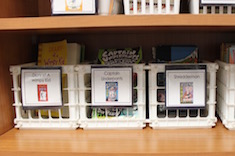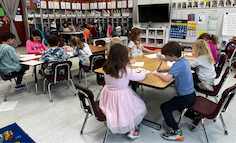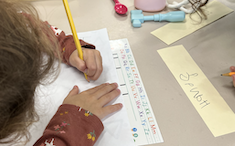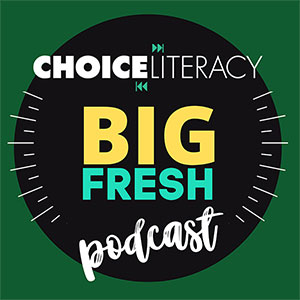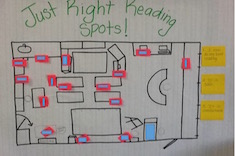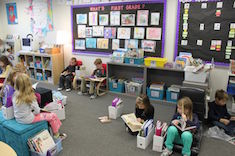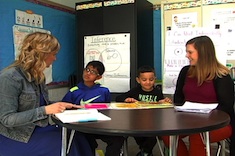Heather Fisher
Heather Fisher is a K-4 instructional coach in Massachusetts. She also has experience as a first-grade teacher, second-grade teacher, reading specialist, and literacy coach. In her everyday coaching practice, she seeks to radiate positivity in her mission to celebrate the small things as students and teachers continue in their daily growth.
All Content
Just Ask Them: Including Students in the Feedback Process
Hypothesizing what our students might be thinking eats into our time to act upon what they’re actually thinking. Heather Fisher suggests, “Let’s just ask the students.” Heather outlines a process for gathering responses from students of all ages and compiling the data to make it useful in determining next steps.
October 17, 2025: Playful Learning
This week’s newsletter is about playful learning.
Embarking on a New Curriculum: What I Must Carry with Me
Heather Fisher is candid about her hesitation in embarking on a new literacy curriculum, as well as her commitment to continue living into her core values. She inspires all of us to lead with integrity by holding on to moments of self-reflection.
The Influence of the Classroom Library
Heather Fisher writes a bold article addressing the many questions educators are facing about their values and beliefs when it comes to our classroom libraries in this time of a heavy emphasis on phonics instruction and decodable books.
Gaining Confidence One Move at a Time
Heather Fisher knows firsthand that confidence does not come easy. Here she shares three intentional actions leaders can take to build their confidence in leading professional learning.
Got Criteria? How to Help Students Engage with Success Criteria
Heather Fisher offers four tips for engaging our youngest students with daily criteria for success.
Supporting Perseverance in Our Students: Before You Say ‘Keep Going,’ Pause to Consider
Heather Fisher addresses how it is hard for educators to hear students on the verge of giving up. Before saying the standard Keep going!, pause, look around, and ask yourself these four questions to respond with greater intentionality and to support their perseverance.
Teacher and Coach, Side by Side: Affirmations for Leaders in Maintaining a Supportive Presence
Heather Fisher helps her father create a pizza pie in his new outdoor pizza oven. Through trial and perseverance, they finally taste success. Heather connects this experience to the importance of encouragement and presence as instructional coaches.
Engaging from the Start: Considering Accessible Professional Development Experiences for a Range of Educators
Inspired by low-ceiling, high-threshold activities in classrooms, Heather Fisher offers three ways to plan professional learning so that it is accessible to a range of educators.
Let’s Do It Again, Together
Heather Fisher revisits a whole-school vocabulary routine that she set in motion. In this update, she shares the ways she adjusted to work together as a team rather than fly solo. This might be just the school-wide vocabulary routine you’ve been craving.
Make and Take…With a Twist: Incorporating Research and Play with Preparing Materials
Heather Fisher taps the power of play in professional learning. By being mindful of incorporating play into professional learning, teachers build their skills and confidence with new materials or strategies in their classrooms.
Connecting the Dots
Heather Fisher realized the possibility of connections while volunteering in the T-ball dugout. This transformed the direction of her coaching conversations as she used questioning and wait time to help teachers make powerful connections between content areas.
It’s Time to Admire: Sharing in the Beauty of Students’ Writing
Heather Fisher shares a process to help teachers learn to admire student writers and find the beauty in their work.
Maintaining an Inquiry Stance: Seeking to Enhance the Practice of Questioning in Leadership
Heather Fisher cracks open some of her secrets to developing and maintaining an inquiry stance as an instructional coach. If you’re looking to strengthen your listening and feedback, this is a great place to begin.
Level Two Unlocked: Using the Language of Video Games to Engage Students in the Assessment Experience
Heather Fisher considers the research behind gamified experiences and applies it to a lengthy first-grade phonics assessment. Heather challenges us to gamify assessments to maintain the integrity of the assessment while increasing student engagement.
Shopping in Your Own House: Searching Our Own Teaching Practice for New Ideas
Heather Fisher explains how to lead colleagues to look for what they need within their own teaching practices before turning to Google or other sites for the answers.
Mining the Data
Heather Fisher shares how to rebrand data meetings as mining meetings to turn anxiety and frustration into actionable and meaningful responses to data.
And I Quote: Coaching Through Quotes and Sayings
Heather Fisher shares ways to use quotes throughout your coaching day to inspire and guide others. Download a list of useful quotes for different coaching situations.
If Your Walls Could Talk
Heather Fisher leads us in realizing the power of wall displays, and offers a reflection guide so all school leaders can make their walls talk in positive ways.
It’s Time to Pause: A PD Session to Reconnect with Core Values
Heather Fisher guides a reflective practice exercise to begin a professional meeting that gives space for participants to pause and consider their core values. This simple experience has the potential to powerfully energize educators.
Fueling Creativity Podcast
Heather Fisher and Ruth Ayres discuss fueling creativity.
The Choice Literacy Book Club Discusses So You Want to Be an Owl
The Choice Literacy Book Club discusses So You Want to Be an Owl by Jane Porter and Maddie Frost.
Playing with Words
Heather Fisher considers the possibilities for extending vocabulary development through a daily word routine.
How Well Do You Know Your Team? Checking In On Our Relationships with Teachers
Heather Fisher guides literacy leaders through a reflective exercise to reveal relationship strengths and gaps that will offer direction in how to strengthen key connections.
Fun with Sight Words
Heather Fisher describes the process of integrating sight word work into the existing curriculum.
Virtual Icebreakers: Maintaining Human Connection (Part 2)
In this second installment of “Virtual Icebreakers,” Heather Fisher shares more creative ideas for opening meetings in order to maintain strong staff relationships while meeting virtually.
Virtual Icebreakers: Part 1
In this first installment of “Virtual Icebreakers,” Heather Fisher shares creative ideas for opening meetings in order to maintain strong staff relationships while meeting virtually.
Plan It, Don’t Wing It
Heather Fisher works with teachers to create a tool to make conversations in classrooms more thoughtful and clearly defined around learning topics. Download a copy of the tool to plan your next conversation.
Finding Meaning in Reading Podcast with Heather Fisher
Heather Fisher discusses planning for professional learning and finding meaning in reading on the podcast.
Defining Through Experience
Heather Fisher works with a group of teachers to define and visualize what “coaching feedback” looks and sounds.
Cheering On Teachers Through Seasons of Change
Heather Fisher has a knack for cheering on teachers and she inspires us to do the same with these three simple and meaningful ideas.
Hidden Gems: Five Ways to Keep Your Positive Vibes
Heather Fisher shares five “hidden gems” she uses to keep her positive vibes strong.
Rethinking Retelling
Heather Fisher helps a group of teachers to dig deeper into why retelling is an essential skill, working together to find examples of retelling beyond classrooms.
Jump Right In and Other Lessons Learned from Remote Coaching
From get rid of the laundry basket behind you to learn how to share your desktop in advance, Heather Fisher shares some practical tips for getting started with remote coaching.
Using Supplies to Inspire
Heather Fisher shares her favorite tools to share as gifts for a new literacy coach.
Smile File
Heather Fisher explains why the smile file should be a tool in every coach’s repertoire for building confidence and community among teachers.
The Power of Video Replay
Heather Fisher explains how viewing excerpts from the same video multiple times can help students in book clubs hone their conversation and reflection skills.
Homework: I Challenge You!
Heather Fisher helps a first-grade teacher create a homework challenge as a way to make the practice more meaningful and engaging for students and families.
Showcasing the Vision
Heather Fisher finds it is much easier to remember a shared vision when it is displayed in classrooms.
The Literacy Master Document
Paper copies here. Paper copies there. Paper copies everywhere. If someone created a children’s book for literacy coaches with this refrain, it would be an instant best seller. Heather Fisher and Kathy Provost take on the challenge of creating an electronic master document to increase communication and save a few trees.
Reading Specialists: Using a Common Observation Form
Kathy Provost and Heather Fisher work with reading specialists who are observing individual students to study the transition of skills from targeted support to work in the classroom. The observation form everyone uses includes an engagement inventory and key questions.
Science and Literacy Units
Heather Fisher takes a group of elementary teachers through the same science learning process they will use with their students, integrating reading, writing, and talk throughout the professional development session.
First-Grade Team: Next Steps
Heather Fisher leads a first-grade teaching team as they plan action steps to take before their next monthly meeting.
Coaching Minute: Case Study Observation Form
Literacy coaches Heather Fisher and Kathy Provost talk about how their work with reading specialists has evolved by having the specialists focus on case studies of individual students, rather than spending much of their time focused solely on big data. They share a form they use to help reading specialists hone their observation skills.
First-Grade Team: Exploring Student Engagement
Heather Fisher leads a first-grade team monthly meeting where everyone shares strategies they are trying for fostering more student engagement.
Visual Expectations in the Classroom
Heather Fisher finds the key to independence for many first graders is lots of visual reminders in classrooms.
Grade-Level Team Meeting: Conversations in First Grade
In this video of a first-grade team meeting with a literacy coach, Heather Fisher uses online resources and anchor charts to build cohesive instruction in talk strategies across the grade.
Coaching Minute: Student Observation Form
In this brief video, Kathy Provost and Heather Fisher talk about the value of trying out a student observation form first within the coaching team before using it in classroom observations with teachers.
Leveled Text Dilemma
"We don't have enough leveled texts!" is the cry from teachers. Heather Fisher helps them move beyond the school book room to more creative online resources to meet students' needs, and move beyond narrow definitions of text suitability.
First-Grade Engagement: Debrief
Heather Fisher and a young first-grade teacher debrief after a demonstration lesson for a partner group on engagement. This is the final video in a three-part series.
First-Grade Engagement: Demonstration Lesson
Heather Fisher and a young first-grade teacher lead a demonstration lesson for a partner group on engagement. This is the second video in a three-part series.
First-Grade Engagement: Planning the Lesson
Heather Fisher meets with a young first-grade teacher to plan a demonstration lesson for a partner group on engagement. This is the first video in a three-part series.
Case Studies All Year Long
Kathy Provost and Heather Fisher talk with reading specialists about the value of following a case study over an entire year.
Coaching Minute: Lesson Planning Form
Kathy Provost and Heather Fisher talk about the value of using a lesson planning form with teachers as a shared record of plans, action, and reflection in coaching sessions.
Exit Slips for Reflection and Planning
In this video, Kathy Provost and Heather Fisher use exit slips to assess the success of a professional development session and plan next steps.
Coaching Minute: Selecting Books for Teachers
In this brief video, Kathy Provost and Heather Fisher share some criteria for selecting books for teachers to open doors and conversations.
Coaching Minute: Better Data Meetings
In this brief video, Heather Fisher and Kathy Provost explain why turning data meetings over to reading specialists has had such a positive effect on schools in their district.
Choosing Our Words Carefully
Heather Fisher and Kathy Provost reflect on how just a few words can define relationships between literacy coaches and teachers.
Planning Family Literacy Night
Heather Fisher and Kathy Provost work with a group of reading specialists to plan a family literacy night.
Coaching Minute: Case Studies with Reading Specialists
Heather Fisher and Kathy Provost talk about how case studies have changed their work with literacy specialists over the past year in this brief video.
Demonstration Lesson: First-Grade Talk Prompts
Heather Fisher presents a lesson with a first-grade teacher as part of a cycle focused on improving classroom talk. This is the second video in a two-part series.
In Search of Just-Right Reading Spots
If children can choose just-right reading spots, they will have more stamina for reading. Heather Fisher explains how she works with first-grade teachers and students to build this skill.
Mini-Breaks for Reading Engagement
Heather Fisher works with first graders to teach them the strategy of taking “mini-breaks” to sustain reading during workshops.
Coaching Minute: Considering Language
Heather Fisher and Kathy Provost share subtle changes in the language they are using with teachers to foster more collaboration.
Demonstration Lesson Planning: First-Grade Talk Prompts
Heather Fisher plans a lesson with a first-grade teacher as part of a cycle focused on improving classroom talk. This is the first video in a two-part series.
Making Fiction Writing Come to Life
Heather Fisher experiences a breakthrough with first-grade teachers when they create fictional characters in a professional development session and then try the same activity with their students.
Coaching Minute: Literacy Master Document
Kathy Provost and Heather Fisher explain how the Literacy Master Document has simplified and improved their coaching.
Celebrate the Process
Heather Fisher works with teachers to design a literacy night for families that celebtrates the process of acquiring new skills, not just final products on display.
Nurturing a Growth Mindset in Young Readers
Heather Fisher shares some of the practical strategies she has developed to assist teachers with the issues of stamina and motivation in primary reading workshops.
Picture It: Student Mentor Text Bulletin Board
Heather Fisher shares an example of a craft resource—a bulletin board highlighting student writing choices that can help peers hone their craft.
Coaching Collaboration: Visual Note Taking in First Grade
Heather Fisher and a first-grade teacher collaborate after an embarrassing classroom observation reveals that students need to develop note-taking skills.
Picture It: A Mentor Text Is Like . . .
Heather Fisher and Kathy Provost use an analogy exercise to provide a quick and creative brain break during professional development sessions.
Picture It: Museum Walk with Quotes
Kathy Provost and Heather Fisher share a simple activity to open or transition in professional development sessions.
Fostering Change with Student Work
Heather Fisher has a secret weapon for nudging teachers toward change: student work samples. She explains how she finds opportunities across the day for sharing them.
Takeout Book Club
Teachers may not have time for one more meeting—but they still have to eat! Heather Fisher combines the fun of lunch takeout with book discussions to boost interest and attendance.
Picture It: Reorganizing a Professional Book Library
In this quick tip, literacy coaches Heather Fisher and Kathy Provost reorganize their professional book library in a simple way that will save hours over the year of hunting for texts.
Coaching Minute: Videos in the Selfie Age
In this quick video, Kathy Provost and Heather Fisher share an alarming experience: young teachers pulling out phones and other devices to take videos of instruction without permission. They discuss the need for school leaders to develop policies that tackle issues of privacy and permission.
Brain and Movement Breaks for Teachers
Heather Fisher explains why breaks are important for learners of any age, and how to incorporate them into professional development sessions.
Planning for PD in the Company of Teachers
Heather Fisher brainstorms with teachers to get the “big picture” of what makes a professional development experience exceptional.
Taking a Walk in Their Shoes: The Importance of Leaders Experiencing the Craft They Lead
Heather Fisher wisely encourages school leaders to take the time to walk in the shoes of those we lead. When we do this, we position ourselves to become more connected with our teachers, more aware of their individual and collective needs, more credible in their eyes, and more mindful of suggesting working alternatives.




